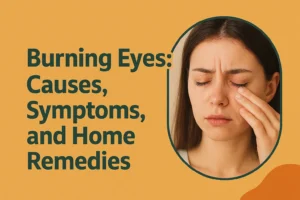“Disease X” is a term used by health experts to describe a potential unknown disease that could cause a global outbreak in the future. While we don’t know exactly what Disease X will be, it is a reminder that new diseases can emerge suddenly, just like COVID-19. It’s important to know what Disease X symptoms could be, as well as how to spot the early signs and protect yourself from potential harm.
In this article, we will discuss about the symptoms of disease X, how to recognize them early and the best ways to prevent the spread of such diseases.
What is Disease X?
Disease X is not a specific disease but a placeholder used by the World Health Organization (WHO). It refers to any new disease that could emerge in the future and spread widely. This disease could be caused by an unknown virus, bacteria, or other microorganisms. Since we don’t know exactly what Disease X symptoms will look like, learning about common signs of infectious diseases can help us recognize them early if they appear.
Disease X Symptoms: What You Should Know
Even though Disease X is a hypothetical illness, many diseases share similar symptoms. Early signs of any serious infection often include fever, tiredness, cough, or difficulty breathing. Let’s look at some of the possible symptoms that we might notice:
1. Fever and Chills

Fever is one of the most common Disease X symptoms we might notice. It’s your body’s way of fighting off an infection. If you suddenly develop a high temperature along with chills, it could be an early sign that something is wrong. Keep an eye on your body temperature, especially if it doesn’t go down after taking medicine.
2. Tiredness and Weakness
Extreme tiredness or feeling weak is another possible sign of Disease X. This may happen without any obvious reason, and it could make it hard to do everyday tasks. If you feel unusually exhausted for no reason, it might be a symptom of disease X worth paying attention to.
3. Cough and Shortness of Breath

Many diseases, especially viral ones affect the respiratory system. A dry cough, trouble breathing, or shortness of breath are common Disease X symptoms. If you have these symptoms and they don’t get better or if they get worse over time, you should seek medical advice immediately.
If you notice fever and cough together it could be a sign of the Delta virus. Learn more by reading our post on Delta Virus Symptoms.
4. Muscle and Joint Pain

Pain in your muscles and joints is another symptom to look out for. If your body feels sore all over, this could be a sign of an infection. For example, many viral illnesses cause muscle aches and it could be a sign of Disease X.
5. Nausea, Vomiting, and Diarrhea

Some infections affect your stomach and intestines. If you have symptoms like nausea, vomiting or diarrhea along with fever or a cough, it may be a sign of disease X. While these symptoms are also common with many illnesses, having multiple symptoms at once should be cause for concern.
6. Headaches and Dizziness

A sudden headache that won’t go away or feeling dizzy could also be part of Disease X symptoms. If you experience this along with other symptoms like fever and fatigue, it might be time to get checked by a doctor.
7. Skin Rashes or Blisters

Some infections cause skin rashes, redness, or blisters. If you notice unusual skin changes along with fever, tiredness or a cough, it could be related to Disease X. Rashes are often linked to infections and it’s important to seek help if you notice any skin changes.
8. Sore Throat
A sore throat is another common symptom of many viral infections. If your sore throat comes with fever, cough or other Disease X symptoms, it could be an early warning sign. Difficulty swallowing could also indicate an infection, so don’t ignore it.
9. Confusion and Trouble Thinking Clearly
In more severe cases, an infection can affect your brain, causing confusion or difficulty thinking clearly. If you start feeling foggy or forgetful especially along with other Disease X symptoms, it might be a sign of something serious.
How to Recognize Early Signs of Disease X
Recognizing the Disease X symptoms early can help stop the spread of the illness. Here are a few things to look out for:
- Sudden Illness: If you suddenly start feeling very sick without warning, it could be an early sign of Disease X. This quick onset is common in many new diseases.
- Multiple Symptoms Together: Pay attention if you have more than one symptom at once. For example, if you have a fever, cough and tiredness together, it could point to Disease X.
- Worsening Symptoms: If your symptoms start mild but then get worse over time, it could be a sign that you are dealing with a serious infection like Disease X.
Precautions to Prevent the Spread of Disease X
While we don’t know exactly how Disease X will spread, we can take some simple steps to prevent the spread of infections in general. Here are some precautions you can take to protect yourself and others:
1. Wash Your Hands Regularly
Washing your hands often with soap and water is one of the best ways to prevent the spread of germs and viruses. If soap and water aren’t available, use hand sanitizer with at least 60% alcohol.
2. Wear a Mask
If you’re feeling sick or around others who are sick, wearing a mask can help reduce the risk of spreading Disease X symptoms. Masks can catch droplets from coughing or sneezing that might carry viruses.
3. Keep Your Distance from Sick People
If someone around you shows any Disease X symptoms, it’s a good idea to keep your distance to avoid catching the illness. Viruses are often spread when a sick person coughs, sneezes, or talks.
4. Clean and Disinfect Surfaces
Regularly cleaning and disinfecting commonly touched surfaces like doorknobs, light switches and phones can help reduce the spread of infections including Disease X.
5. Stay Informed
Stay updated on health guidelines from trusted sources like the WHO and CDC. These organizations provide valuable information about outbreaks and offer tips on how to stay safe from diseases like Disease X.
Conclusion: Stay Safe and Be Prepared
While we don’t yet know exactly what Disease X symptoms will be, it’s always good to be prepared. Recognizing the early signs of illness, taking precautions and staying informed can help keep you and others safe. By washing your hands, avoiding close contact with sick people and wearing a mask when needed, you can help prevent the spread of any infectious disease including Disease X.
Frequently Asked Questions
1. What are the common symptoms of Disease X?
While we don’t know the exact symptoms of Disease X, common signs of emerging diseases often include fever, chills, fatigue, coughing, shortness of breath, muscle aches, and gastrointestinal issues like nausea or diarrhea.
2. How can I tell if I have Disease X or just a regular cold?
The key difference is the sudden onset and severity of symptoms. Disease X symptoms may come on quickly and involve a combination of severe fever, fatigue and respiratory issues. If your symptoms persist or worsen over time, it’s important to seek medical advice.
3. Is there a vaccine for Disease X?
Currently, there is no specific vaccine for Disease X because it represents a potential future disease. However, scientists are constantly researching new vaccines and preventive measures for emerging infectious diseases.
4. How does Disease X spread?
The way Disease X spreads is unknown, as it represents an unknown disease. However, similar diseases spread through direct contact, airborne droplets from coughing or sneezing, or contaminated surfaces. Good hygiene practices like hand washing and wearing masks can help prevent transmission.
5. What should I do if I think I have Disease X symptoms?
If you experience any of the potential symptoms such as fever, cough or difficulty breathing, it’s important to contact a healthcare provider right away. They can guide you on the best course of action and help prevent the disease from spreading to others.
Images By: FreePik




